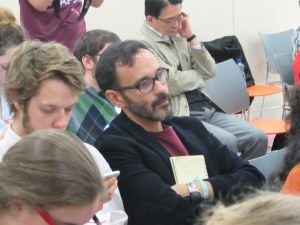Democracy has come to nuclear disarmament

Carlos Umana of Costa Rica, at the ICAN campaigners meeting in Geneva preceding the OEWG.
[Carlos Umana, the president of IPPNW’s Costa Rican affiliate, spoke on behalf of IPPNW and ICAN at today’s meeting of the Open-Ended Working Group on nuclear disarmament at the United Nations in Geneva.]
Mr. Chairman,
Thank you for permitting me to take the floor. I speak on behalf of IPPNW Costa Rica, a partner organization of ICAN.
This OEWG attests to the fact that democracy has, indeed come to nuclear disarmament, as it is clear that the majority of nations are unsatisfied with the status quo and are ready to pursue truly effective measures conducive to nuclear disarmament. Echoing Jamaica’s statement today, “Yes, we can take forward multilateral negotiations.” Nuclear disarmament is feasible, if we work for it. And that is what we are here to do.
As outlined in our statement yesterday morning, ICAN supports the negotiation of a treaty with a broad range of prohibitions on nuclear weapons:
- Prohibitions on their development, production, testing, acquisition, stockpiling, transfer, deployment, threat of use, and use.
- And prohibitions on any assistance, financing, encouragement, and inducement of these acts.
This list, however, is not meant as an exhaustive one. We are open-minded to the possibility of including additional prohibitions in the treaty.
We strongly believe that the new instrument must reflect a “zero tolerance” approach to these worst weapons of mass destruction.
We propose the following principles to guide the negotiations on the scope of the prohibitions, with the aim of ensuring that no loopholes remain.
First, the treaty should forbid its parties from engaging in any activities that might facilitate improvements to the nuclear arsenals of any state.
Second, it should forbid its parties from contributing in any way to preparations for the possible use of nuclear weapons.
Third, it should forbid its parties from conferring any legitimacy on nuclear weapons through their policies and practices.
And fourth, it should forbid its parties from undermining in any other way progress towards the realization of a nuclear-weapon-free world.
We believe that there are several pertinent questions regarding the scope of the prohibitions that warrant further examination.
In particular, how can the treaty effectively prevent its parties from claiming protection from a so-called nuclear umbrella?
We note with deep regret that Australia, a party to the South Pacific nuclear-free zone treaty still claims protection from nuclear weapons in its military doctrines.
The global treaty banning nuclear weapons should seek to abolish military construct.
The issue of the modernization of nuclear forces must also be discussed further.
Would prohibitions on the development and production of nuclear weapons be adequate to prevent assistance with modernization work?
How can the new treaty help stigmatize modernization programs?
We must discuss, furthermore, the question of delivery vehicles – the bombers, the missiles and the submarines used to launch nuclear weapons.
Should the development and export of such delivery vehicles be prohibited?
Another concern is engagement in nuclear war planning. How can the treaty prevent its parties, for example, from sitting on nuclear war committees?
How could it prevent its parties from gathering and sharing intelligence for the purpose of targeting – and potentially using – nuclear weapons?
The forward deployment of US nuclear forces in Europe raises important questions for the negotiations of the treaty.
As discussed last week, five NATO non-nuclear-weapon states – Belgium, Germany, Italy, the Netherlands, and Turkey – still host nuclear weapons on their soil, despite being parties to the NPT. Assuming that these states will join the ban treaty – will it be necessary that they have no nuclear weapons upon becoming parties? Or could they join the treaty, and then do away with the weapons?
Is it acceptable for these states to return the weapons to the possessor state, or should we insist that they be dismantled by these states themselves?
The issue of the financing of nuclear weapon programs also warrants further attention. We commend, in this regard, NGO Working Paper 14. How can the treaty banning nuclear weapons help stem the flow of money to nuclear weapon programs? Treaties relating to the financing of terrorism may include some useful provisions in this regard. Terrorism, after all, is what we are debating here.
As a number of delegations have proposed, the treaty could also prohibit the production of fissile material. A stand-alone treaty may prove unnecessary.
A number of delegations have also called for an explicit prohibition on sub-critical nuclear testing. This proposal we fully endorse. It would fill a significant gap in the Comprehensive Nuclear-Test-Ban Treaty.
Mr. Chairman,
We do not envisage that the ban treaty will initially include a complex verification mechanism relating to the destruction of stockpiles. However, some form of compliance mechanism may nevertheless be needed to ensure that parties adhere to the various prohibitions in the treaty. How, for example, are we to ensure that states which formerly hosted nuclear weapons on their territory have in fact ended that prohibited practice?
I hope that these questions are useful as we continue this debate, and as we approach the first negotiating conference in 2017 for the ban.
Thank you.



Reblogged this on A Green Road Daily News.